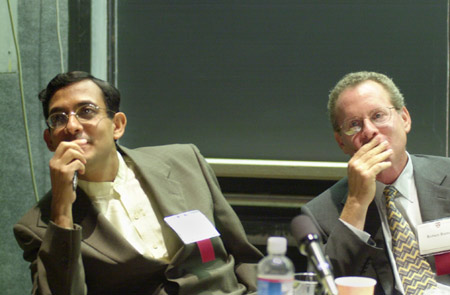Does foreign aid aid? Discuss.

The rich around the world are getting richer, but the poor aren’t necessarily getting poorer, as globalization-spurred trade boosts their nations’ economies, a panel of international development experts said Friday (Oct. 12).
A major exception to this view is that the poor in large parts of the world are undoubtedly getting sicker, as treatable diseases such as tuberculosis and malaria, and newer scourges such as AIDS rage virtually unchecked through large parts of the developing world.
In those countries, the benefits of globalization are largely unrealized, as health-care systems strain to deal with increasing numbers of people dying of AIDS, and social service systems struggle with the influx of a generation of AIDS orphans.
The international development symposium, called “Balancing the Scales: Global Inequality and the Challenge of Development,” was moderated by Harvard Professor of Economics Michael Kremer, and featured Harvard professors Jeffrey D. Sachs, the Galen L. Stone Professor of International Trade, and Robert J. Barro, the Robert C. Waggoner Professor of Economics. The panel also featured two outside experts: Massachusetts Institute of Technology (M.I.T.) Economics Professor Abhijit Banerjee, and Stanley Fischer, senior adviser to the managing director of the International Monetary Fund.
The panel spoke before an audience of about 120, mostly invited guests, in Science Center D. Among the group were the parents of President Summers, Robert and Anita Summers, both retired economics professors from the University of Pennsylvania.
“It was very interesting,” Robert Summers said of the discussion. “They were talking about the things that could potentially make a difference.”
After establishing a broad global context, panelists highlighted nuances of the global economic stage. Though globalization is in full swing, participation in the global economy is not. Large countries with developed middle classes and cheap labor, such as Mexico, Brazil, India and China, are benefiting greatly, but M.I.T.’s Banerjee questioned whether globalization would be truly global.
Using Nepal as an example, Banerjee said the least developed countries have little to offer world markets. As the demand for quality goods grows in the developed world, even the attraction of being able to offer lower manufacturing costs may not be enough to let a country such as Nepal share in the benefits of globalization.
Increasingly, Banerjee said, established contacts in the global economy are important in participating in world trade.
“It’s hard for me to imagine what Nepal could sell on the U.S. market because the demand for quality will demand exclusion,” Banerjee said. “The challenge of distributing the benefits of world trade and the wealth of the world has just gotten harder.”
The discussion was kept lively by a dispute between Barro and Sachs as to whether foreign aid does any good. Barro said his research shows that foreign aid – what he termed “money-for-nothing policies” – is actually counterproductive. Sachs, on the other hand, said foreign aid hasn’t worked because the developed countries have never really tried to make it work.
Sachs, who is working to secure a massive $25 billion international aid program aimed at combating AIDS and improving health services in developing countries, said millions of people die each year of easily preventable diseases such as measles. He cited the eradication of an earlier scourge of humankind, smallpox, as evidence that a coordinated international effort could be fruitful.
“We’re kidding ourselves if we think it’s going to get better by itself,” Sachs said. “Only one in 1,000 [African AIDS patients] has care. They’re dying completely untouched by modern medicine. … Development is not a spectator sport. There are parts of the world that will develop, but most won’t develop without our help.”
But Barro said foreign aid appears to not only not do what its backers hope, but also be a disincentive for growth.
“On average, it seems to be a negative in promoting development, probably because it goes into the government and promotes corruption within government,” Barro said, adding that the health delivery systems needed for many modern medicines are missing in many poorer countries. “I think clearly it [foreign aid] would be worth the money if it worked. I’m not sure you should even try because the effect seems to be negative.”
Fischer struck a middle ground between Sachs and Barro, saying that aid works when it is sent to countries with good government and competent political leaders. He said he hoped in any international mobilization against AIDS that the importance of promoting competent governments isn’t forgotten.
“In countries where policies are good, the rates of return are good,” Fischer said. “Institution-building is an important problem.”
The panel tackled the charges – raised by globalization’s opponents – that globalization hurts the poor and the environment. The group agreed that globalization generally helps a country develop and, by helping those countries’ economies, indirectly helps the poor. It also, however, increases the gap between the rich and the poor, leading to increased crime and unrest.
The environment, they said, could be aided by globalization, given that environmental problems often transcend national boundaries. Many global environmental problems, however, need much more attention. Global warming will largely affect the poorest countries. In addition, the felling of the rain forests and extinction of plant and animals around the globe are continuing.
“Trade is not the evil here,” Sachs said. “[But] my view is that the failure to treat the issues of the poor and the environment is [due to] the neglect of the rich…. The point doesn’t get made in officialdom, that’s why it’s being made in the streets.”
Contact Alvin Powell at alvin_powell@harvard.edu




